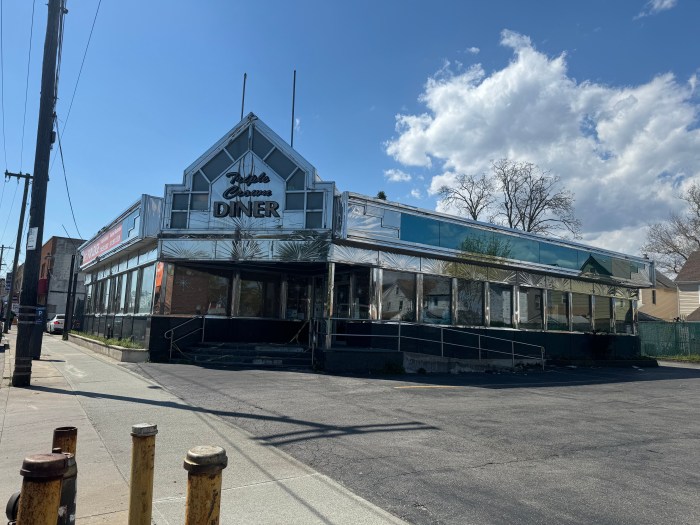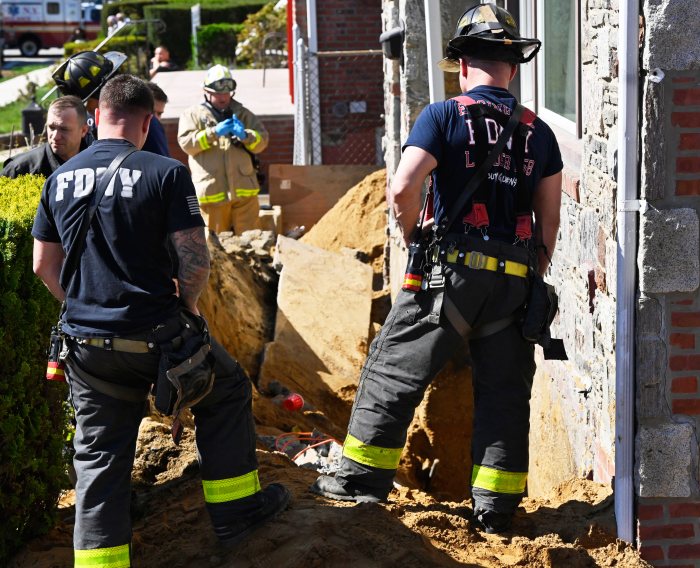By Betsy Scheinbart
Springfield Gardens residents who are tired of living next to a growing waste transfer station argued their case before a state Department of Environmental Protection official at a forum Monday.
Cross County Recycling at 122-52 Montauk St. has been around for 24 years, but has expanded from handling cardboard to transporting all household waste and some construction and demolition materials.
Nearly 100 area residents attended Monday’s meeting, sponsored by the Queens Community Council and Development Association, and collectively called for the station to be closed.
Frank Lambraia, a spokesman for Cross County said: “I have no comment, because we have a meeting with Queens Borough President Monday, so I’m sure whatever problems they have will be ironed out.”
Terrell Webb, who lives with his wife and small children just a few doors down from the station, said “my major concern is who allowed this company to go from recycling to solid waste practically overnight.”
Webb was one of many parents who sat through a two-hour-long forum in a sweltering church on Montauk Street to express his concern for the health and safety of his children and the rest of the community.
The DEC issues permits to waste-transfer stations like Cross County and has both renewed and changed those permits over the years, allowing for more trash to be handled, said Mary Ellen Kris, a representative of DEC Commissioner Erin Crotty.
The station handled about 350 tons of garbage a day in 1990 and now transfers some 500 tons a day, Kris said.
The city also issues such permits, but invited guests from the city Departments of Sanitation and of Environmental Protection did not attend the meeting, so many questions involving city procedures remained unanswered.
Council President Warren McCain said he hoped to get those questions answered soon.
Cross County has had the right to transfer solid wastes since its first permit in 1985, Kris said. Its permit is up for renewal in April, 2002
“They have had a permit for a long time,” Kris said. “It may well be that they were making money on cardboard and then made the change to all household garbage.”
When the change was made about two years ago, the smell of the transfer station worsened, neighbors said.
“Prior to about 1 1/2 years ago, we just had cardboard and a rat problem,” said Gertrude Gonesh, a community activist and president of the local block association. “Now we’re having city waste and everything else in the world.”
The crowd loudly agreed with Gonesh and renewed their plea for the facility to be closed down. They said the inspector assigned to the site may have too many other projects on his plate and does not spend enough time at Cross County.
Bernard McBurnie, the main inspector for the state DEC who handles Queens’ 12 major stations and 25 or so smaller ones, had little to say at the forum.
Six of the major transfer station in the borough, which require state DEC permits, are located in southeast Queens.
Patrick Jenkins, the executive assistant to U.S. Rep. Gregory Meeks (D-St. Albans) said the federal government does not fund this transfer station. He also recommended that homeowners contact state Sen. Malcolm Smith’s (D-St. Albans) office about joining the senator’s environmental council. Smith’s office number is 291-9097.
Kris recommended that neighbors call complaints about the station into her office’s hotline at 482-4996 or the law enforcement duty desk at 482-4885.
While Kris admitted that Cross County had not been well-known as a problem site up until now, she said: “The community’s concerns are now front and center in my office.”
Part of the reason why no violations have been found may relate to the times of day that McBurnie inspects the site, Kris said. She recommended that he return at night and other odd hours.
Other major complaints from area residents involved the noise associated with the transport of 500 tons of trash a day on 17 large trucks a day.
In June, the city began permitting the station to operate at all hours instead of only 6:30 a.m. to 3:30 p.m.
“You can’t even sleep,” Jennie Smith said of the noise.
City sanitation trucks, not small, contracted vehicles, bring in the waste and 18-wheelers, not eight-wheelers, haul it out, Gonesh said.
Kris said she was not aware of the larger trucks.
“If there are trucks out here that are not permitted to be, the truck will be ticketed,” she said. She also acknowledged that the site is surrounded by a residential neighborhood and that she understood the residents’ concerns.
Reach reporter Betsy Scheinbart by e-mail at Timesledger@aol.com or call 229-0300, Ext. 138.
































